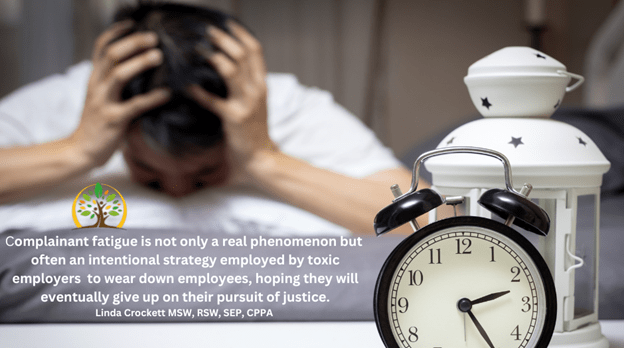Strategies for Effective Resolution and Support in Workplace Harassment and Bullying Cases
Complainant fatigue refers to the exhaustion and frustration experienced by individuals who repeatedly report issues such as harassment, bullying, or discrimination, only to see little or no action taken to address their concerns.
Several factors contribute to complainant fatigue:
- Lack of Action: When complaints are not taken seriously or result in minimal changes, complainants can feel that their efforts are futile. Many tactics can delay action, such as refusing to investigate despite complaints, witnesses, and evidence. This is when action needs to be taken through unions, WCB, Human Rights, or legal consultation
- Stalling Processes: When employers continually create delays that sabotage the complaint’s progress, it can lead to fatigue. Unions, WCB, Human Rights, or Labour Relations can step in during these times. However, if for example, the union is also stalling—such as not returning calls, not following through, failing to ask the right questions, or being vague and inconsistent—it can contribute to complainant fatigue. Contact Labour Relations if your union is not doing its due diligence.
- Repetition: Continually reporting the same issues without resolution can lead to helplessness and frustration. It is essential to contact a trauma-informed psychological safety consultant who can assist you in creating your ‘story passport.’ A story passport can prevent fatigue, retriggering, and flashbacks and help you move forward with your recovery.
- Retaliation: Fear of retaliation or negative consequences for speaking out can add to the stress and fatigue of complainants. One example of retaliation is when a toxic employer, leader, peer or mobbing group weaponizes the complainant’s recent mental health diagnosis ironically caused by the harassment or bullying. A trauma-informed psychological safety consultant can assist you in learning about your rights, options, solutions, and steps to protect yourself.
- Emotional Toll: Constantly reliving traumatic experiences can be emotionally draining and exacerbate mental health issues. Documenting the abuse can help protect your mental health, memory, confidence, sleep patterns, courage, and credibility.
- Bureaucratic Hurdles: Navigating complex reporting systems and procedures can be time-consuming and discouraging. You do not have to go through this alone. If internal or external systems are not helpful, contact this organization. If we can’t help you due to our location, we have international networks we can recommend.
“Complainant fatigue is not only a real phenomenon but often an intentional strategy employed by toxic employers to wear down employees, hoping they will eventually give up on their pursuit of justice.”
To address complainant fatigue, psychologically safe organizations can take several steps:
- Effective Response Systems: Implement systems that promptly address complaints and restore complainants’ trust in the process. These changes may include accessing external resources such as qualified, trauma-informed psychological safety consultants with training in assessing psychological injuries and/or third-party trauma-informed investigators.
- Support Services: Providing access to trauma-informed workplace “harassment specialized counselors and other support services” can help complainants cope with the emotional toll of reporting. These support services can advocate for injured workers, ensuring they do not feel isolated and remain connected healthily.
- Transparency: Keeping complainants informed about the progress and outcomes of their complaints can help mitigate feelings of helplessness. Regular check-ins matter.
- Protecting Complainants: Strong protections against retaliation can encourage more individuals to come forward. If the employer does not protect the employee, the employee should contact us or similar services to ours who can become part of their protection group.
- Streamlined Processes: Simplifying reporting procedures can reduce the bureaucratic burden on complainants. A trauma-informed psychological safety consultant with qualifications to assess psychological injuries can assist in making this happen, ultimately saving lives and millions each year.
Being aware of the signs and tactics that lead to complainant fatigue is crucial for self-protection, avoiding pitfalls and barriers, and creating a safer and more supportive environment for individuals to report and resolve issues of harassment, bullying, and discrimination. Understanding the causes and deliberate tactics of complainant fatigue helps employees reach out early for appropriate support and protection, mitigating the impact and ensuring a fair resolution process.
“Awareness is prevention. Don’t let them silence you. Recognize the toxic tactics aimed at wearing you down and stay strong. Your persistence is a step towards justice and positive change. Don’t let them win.”
Linda Crockett MSW, RSW, SEP, CPPA


